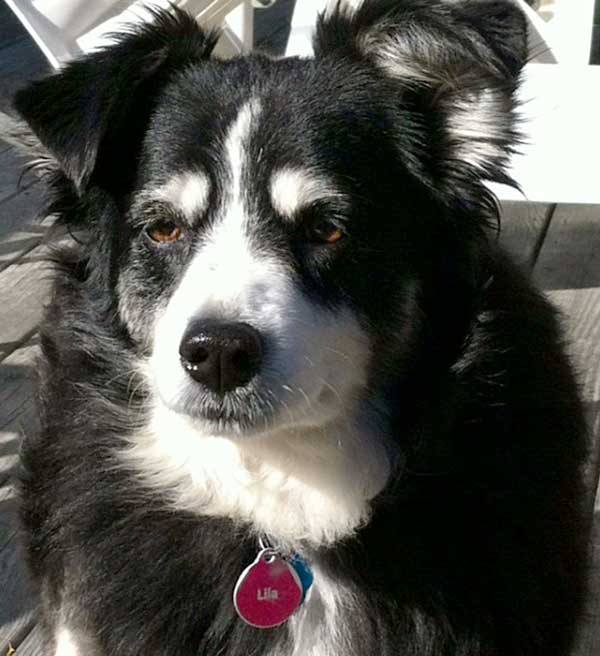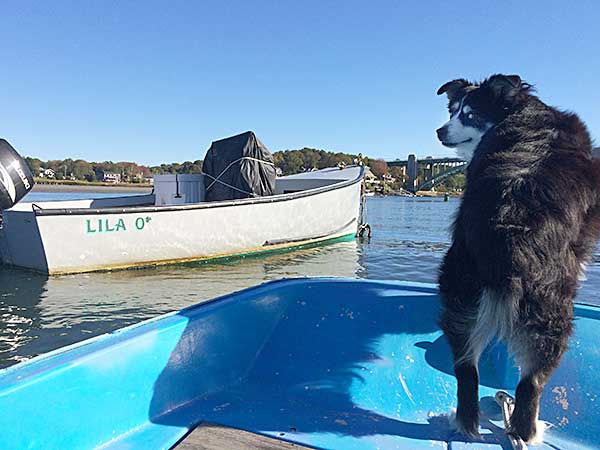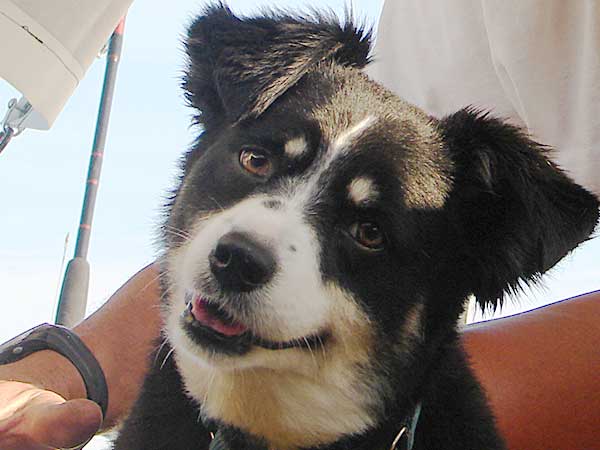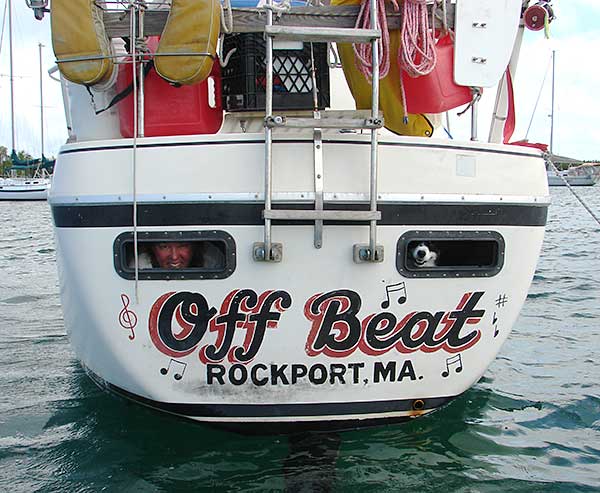
Her Last Day
She is panting for no reason. The day before she seized several times. During one episode, she fell, peed herself and landed on her side at the brink of the open stairs off the deck. I had to catch her to keep her from falling down the flight.
Last night she woke me twice and I got dressed and took her down. She peed and struggled to poop. No amount of coaxing would get her to climb the stairs, so I carried her—all 37 pounds of my dear Aussie Shepherd Lila up two flights of stairs to the deck. It is time.
We spent a quiet day. I cooked a plate of bacon and we ate it together on the floor. She has been good today. She deserves it.

Barbara Boudreau
Lila was just a marvelous dog, and I "see" her still. She also has started coming into my dreams, healthy, running, barking and just being the great companion she was in life.
Our friend John came over about midday with a shovel and pick and dug the hole. We found the bones of our cat Lingala, gone now 7 years. I smiled and told John the story. Lila and Lingala were friends and now they can rest together.
After John leaves, we are on the floor and she is alert and calm. I listen to her heart just chugging away. Yesterday it was irregular and she had multiple seizures. I have made my decision.
Lila is about 102. Not bad for a pet store puppy from an Iowa puppy mill with inauspicious beginnings. Her first owners kept her trapped in a crate wearing a shock collar for 2 ½ years. Nothing for her to do but obsess about nothing.
She was a wreck when I got her—fat, nervous, distrustful. She pooped in the house for a year; not every day by any means, but often enough to make me get up first to clean up before my husband Al knew. I kept saying, "She's just confused. She'll get it right." Which she did. It just took a while. She had no knowledge of the world; people, water, traffic, rules. They had confined her and given her nothing to do, and she was slowly losing her working dog's mind. They can't be left with nothing to do or they will find something. Hers was barking, but they took that outlet away from her too. One thing I know—Lila can bark.
I learned early on with her; to give her a job to heal the neuroses and the pain of being censored and ignored. Take her someplace new—like the boat, which she simply tolerated, and have her shoo the gulls, which she loved. All of our mooring neighbors asked to borrow her as they scrubbed the gull shit off their deck on their hands and knees. We joked about renting her out; $10.00/hour on the deck of your boat. You don't even have to be there! We could mount a "Predator on Board—No Shit!" sign on our transom with our phone number.
When Lila came to us I was a neophyte dog owner. Oh, we had dogs as kids; dogs that slept in a box in the garage and were tied to a long rope in the backyard in good weather. But I read all the books as soon as I could and then worked her every day.
I gave her a big twisted rope her first day, bought it on the way home along with a collar and some decent food to replace the pizza they had been feeding her. She destroyed the rope in three days, eviscerating the strands with a tug like a wild predator, then a flip of her head and tongue to jettison the string to the side. I bought her another, and another, and another. She tore the fuzz off tennis balls, clamping one between her front feet, leaving a wreckage of little wet lime-green piles, until she could puncture a canine tooth through the rubber and reduce the ball to pieces. She found all of her own balls. I never had to buy her one. We'd go for a walk, and she'd come home with a ball, to chase for a bit and then destroy. And she was fast. She could do a tennis ball in less than an hour. When she was finished, she would get up and abandon the remains of her conquest. It had fulfilled its purpose.
I got her off leash in two weeks and rarely used one again, usually when someone said, "Please put your dog on a leash." I held myself back from replying, "Does she look like she needs a leash?" as she stood at attention by my side completely ignoring barking, lunging dogs on leashes. Off leash, at least she had a chance to escape the aggressive ones if they overpowered the person they were attached to—with a leash, of course. If she didn't know you, she ignored you. She didn't dig kids, who unfortunately wanted to pet her all the time, and I saw her show her teeth more than once. I finally just started telling them that she was a "working dog" and that she shouldn't be touched. Problem solved.

Barbara Boudreau
This photo of Lila on the bow of our skiff was taken in Gloucester and I thought it was cute that the boat's name was "Lila O".
She had the best sense of humor I've ever seen in a dog. She would bring me her rope for tug-of-war or a ball to play catch and throw it at me, stomp her front feet and stare at it, then shift her eyes up to mine with an animated challenge. That invitation to play made me laugh out loud every time.
She never took anything that wasn't hers; not once in 15 years. Not a shoe or a sock, phone or remote. She destroyed all of her stuff, exorcising her own demons. She did steal half a meatloaf once from the kitchen island, then cleaned up so well, we didn't realize it was missing until the next day's hunt for leftovers. "Didn't we have half a meatloaf?" as we finally noticed the crumpled but shiny clean piece of aluminum foil shoved under the island.
My mind reels with all her antics as we share her last day. We have 15 minutes until Jane picks us up and I'm crying for the 50th time today. My eyes are red and swollen but everybody will understand. These are the last minutes with my dog alive and falling asleep beside me. She is dreaming now about chasing sheep, her legs and nose twitching. Then she opens her eyes and is once again taking care of me.
She raises up to her elbows and when her eyes connect with mine, I beg her, "It's your time, you know that don't you?" Her eyes hold that gentle Understanding of All Things. We lock our gaze and I realize that she is the only being besides Al with whom I can do that. She came to me raw and nervous, about 25 human years old when I was 45, quickly out-aged me and now is departing a wise and peaceful creature.
It's a beautiful, warm sunny day when she makes her last trip down the 27 stairs she has navigated for 15 years. The ride is in slow motion. We sit in the backseat because it is easier that way. I am broken and no longer fighting tears that come in a bizarre constant stream, like a leak in an awning. My COVID mask is wet and I haven't put it on yet. Jane drives in silence; she's the perfect person for this chore. The poor woman just put her dear Rocky down in January. Alone. I needed someone. I am not equipped to do this alone. It would be dangerous for me to drive.
When we arrive, I call and then we wait. Now that this is in motion, time is too fast and too slow all at once. I help Lila from the backseat. She seeks the grass—pees and poops. Though blind and nearly deaf, she knows where she is.
A woman comes out and offers to carry her. "No," I say. "She can do it herself." We walk slowly to the door. It is a dignified last journey. Jane asks if I want her to come. "Yes," I say. I just don't want to do this alone. Dear Jane. I'm so glad she is here.

Barbara Boudreau
Lila looking down below from the cockpit of our small boat on a trip to the Bahamas.
Inside, the vet tech lifts Lila to the table and she pants with nerves. I bring out the treats; she doesn't want them. All four of us; Jane, the doctor, the vet tech and I fawn over her. They offer more treats and she eats them.
The two other women leave the examining room. It seems like they are gone a long time. My whole face is wet. I immediately pull off my mask, hold her face and kiss the top of her head, repeatedly. This is for me, because I know she doesn't like it. She is a working dog and will tolerate a brushing, but not a cuddle. She doesn't pull away. She knows.
They finally come back in and I catch my breath.
"Are you ready?"
"Of course not."
They are gentle and efficient. Poor women—they have done this so many times before. The doctor explains everything while I fight panic. I could stop this. She's having a good day after all. But my friend Nancy's (who knows all things DOG) words reverberate in my head: "People make an appointment, then cancel, then reschedule, then cancel. Then something traumatic happens and you have an emergency. Give her the dignity to go out on a good day." Of course she is right.
They administer the sedative and Lila stands up, defiant to the end. She refuses to acquiesce when the ladies ask her to lie down. She will go out swinging.
The women leave the room again and now I am at her head telling her how good she is. I can see she is flagging, but she stays on her feet as long as she can. Finally her hind quarters collapse to the side and I move her gently into place on the table. She is falling to sleep and I am cooing her praise nonstop.
The women come back in. This is it. She is still alive, but this is it. The doctor acts quickly, then brings out her stethoscope. I cling to Lila's head.
"She's gone."
They exit again. It is quiet as these things are. I lay my head down on her body and let go. Jane is standing now with her hand on my back and I sob like a child. Nothing could have prepared me for this.
I have lost family members and friends, but this grief is so very raw. I have done it, and I can't turn back. I have been told that this is right, but then why do I feel evil? I want to experience the benevolence that I am told I have shown by making this decision. For now, there is no good in it.
But a tremendous weight is now gone as well. I no longer have to wonder when and how. Gone is the worry that she will fall down the stairs. Gone also is my heart for the last 15 years.
They come in and offer to bring her out to me. I mumble yes and allow myself to be guided out the door. In a few minutes, they bring me a neat package, complete with orange ribbon tied around her threadbare towel shroud. This was her bone-eating towel, the one that dried her after baths.
She is heavy in my lap and I bear her weight for the last time. I lay her gently in the hole and place Lingala's bones on top. I fill the hole robotically. Jane brings out a poem. I am so glad, because I have prepared nothing. It is a beautiful September day when my dear Lila goes to her final rest.

Barbara Boudreau
Lila and me looking out the portholes on the transom.
About the Author, Barbara Boudreau
The travel bug took Barbara on a life of adventure, from the Bering Sea to teaching in Japan, to the high plains savanna of central Africa, but she has finally settled in Gloucester, MA with her jazz drummer and sailor husband, Al Boudreau. Winters often see them in the Bahamas, sailing their 30′ catamaran "Catitude."
Barbara has published two novels, The Frenchman (2013) and its sequel, Death of the Frenchman (2020) as well as many articles in magazines.







 Loading Image...
Loading Image...